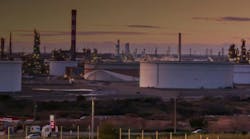Health and safety concerns are as old as the petroleum industry itself (see related special report beginning on p. 66). Working in the very early oil fields was a dangerous affair, and wooden derricks, makeshift tools, and poorly trained workers were a safety mix made in you-know-where.
The work was not only hard on the men, it was hard on the environment. The countryside was stripped of trees to build derricks, and "gushers" left seas of oil soaking the ground and running into streams and rivers. In the country's rapid expansion, there was still a sort of "take-it-and-move-on" attitude towards natural resources.
That way of doing business, of course, is long gone. Great pains are now taken to not only leave things as we find them but make improvements as we go. We still need to be aware of past problems, however, in order to keep ourselves out of trouble in the future. So read on. How many health, safety, and environmental "difficulties" do you see at Buchanan's farm, April 1861?
Crude oil is flammable
The industry was still an infant when it suffered its first great disaster. The story is told in detail in the book History Of Petroleum, by J.T. Henry, published in 1873.
The date was Apr. 17, 1861, and the place was the Buchanan farm, Rouseville, Pa. Here is what happened in the words of Henry, who was a witness.
"Just after supper, on the evening of Apr. 17, 1861, Mr. Rouse, Mr. Perry, Mr. Buell, and myself and others were in the sitting room of Anthony's Hotel discussing the fall of Fort Sumter...when a laborer on the fatal well hurried into the room to say that a monstrous vein of oil had been struck and barrels were wanted to preserve it.
"All ran to the well, with the exception of myself, and I, not seeing the man who attended to the distribution of the barrels, started in the opposite direction for teams to haul the necessary packages. I had completed my errand and was on a full run for the well with less than 20 rods to make, when an explosion occurred which nearly took me from my feet.
"On the instant, an acre of ground, with two wells and their tankage, a barn, and a large number of barrels of oil, were in flames, and from the circumference of this circle of fire could be seen the unfortunate lookers-on of a moment before, rushing out, enveloped in a sheet of flame which extended far above their heads, and which was fed by the oil thrown upon their clothing by the explosion.
"...So numerous were the victims of this fire and so conspicuous as they rushed out, enveloped in flame, that it would not be an exaggeration to compare them to a succession of shots from an immense Roman candle."
The well was drilled in a low, poorly drained field. It began flowing at an estimated 2,500 b/d at about 5 p.m. A crowd of about 150 people had gathered nearby to watch the spectacle, when an hour later the well exploded. Soon ignited was the nearby stack of 100 wooden barrels already filled with oil. Actually, some of the onlookers were standing on the oil barrels.
Henry then described how other people nearby tried to help the injured but had little first aid knowledge or medical equipment. Many of the injured died simply because nobody knew what to do for them.
Henry Rouse, owner of the well, died of severe burns 5 hr after the explosion, which claimed a total of 19 lives.
Environmental nightmare
You can imagine what this wild well and explosion would have done to its surroundings.
"The well burned for 3 days before it could be extinguished," said Henry, "which was finally done by smothering it with manure and earth. Its appearance while burning was grand. From the driving pipe, 6 in. in diameter, to the height of 60 or 70 ft, arose a solid column of oil and gas burning brilliantly. Above this hovered an immense cloud of black smoke, which would seize sections of the ascending flames, and, rolling over and over, first exposing to the view cloud and then flame, would rise a 100 ft higher before the flame would fade out.
"From the main column below, millions of individual drops of oil would shoot off at an angle, and then, turning the arc of a circle, drop burning to the ground presenting all the hues of the rainbow, making a scene like enchantment. The whole was accompanied by a roar hardly inferior to that made by Niagara Falls."
It is unknown exactly what started the explosion and fire, but some bystanders said it was sparked by a cigar.

